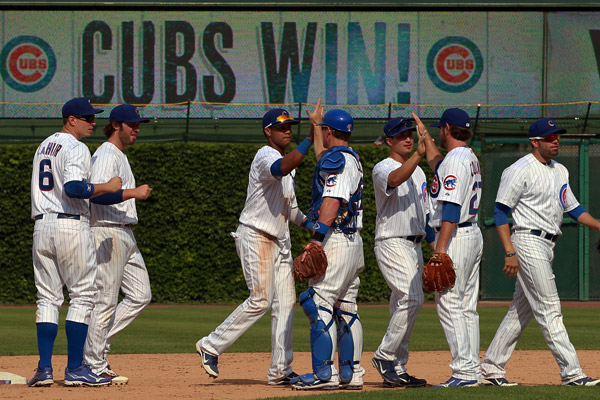
Phil Velasquez/Chicago Tribune
Sometime between pitchers-and-catchers-report and Opening Day, Forbes produces its annual list of the most valuable baseball franchises, which is always a good time, not least because it's a chance for the Cubs to be competitive in something. They've ranked high on the list for years—this year, they're number four in overall value, unchanged from last year, and number one in operating income, just ahead of the competitive-on-the-field Orioles.
And there's more to expect where that comes from:
The business magazine said the Cubs figure to be in even better shape after 2014, when they can opt out of their WGN-TV deal and sign a more lucrative contract. Forbes said the Cubs made less than $50 million last year from their broadcast affiliates, CSN Chicago and WGN.
Earlier this year the Dodgers signed a seven billion dollar TV contract; over the course of 25 years, that's $280 million a year, though some of that goes back to the league.
So it'll be flush times ahead, between the Cubs' league-high profits and a new TV deal, right? Not entirely. The Cubs also finished first in debt to value ratio—58 percent, higher even than the Madoff-victimized New York Mets. In 2010, Crain's Eddie Baeb got the most detailed look into their finances that I've seen; as one would expect from an investment banker who's the son of TD Ameritrade's founder, their debt is elaborately structured:
Because of tax implications, the highly complex deal Tribune Co. [owner of Chicago magazine] put together required the Ricketts family to borrow money for the transaction. The family reportedly financed more than $400 million from banks while raising the rest from liquidated family assets and moving the money between family-owned entities to create a debt-like structure designed to satisfy the IRS but not overly burden the Cubs enterprise.
This created an unusually high level of debt for the Cubs, who are carrying almost $350 million less in guaranteed contracts than the Yankees. Sources said the Cubs also are challenged because the lack of signage at Wrigley Field and undervalued media contracts Ricketts inherited from Tribune Co. adversely affects their operating income.
The Forbes valuations put their debt at about 18 times their operating income, well above MLB's nominal limits, but they're not alone in that and Bud Selig giving the okay. In 2009, tax law expert Sarah Lawsky (then of George Washington, now of Cal-Irvine), did an analysis of the tax law behind the deal; a clearer explanation might be Michael Oneal's piece for the Tribune, "Chicago Cubs sale deal in 'uncharted territory.'"


